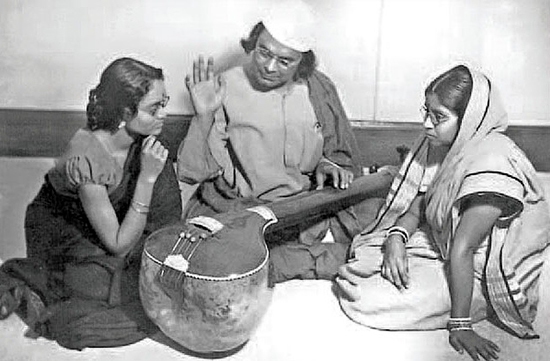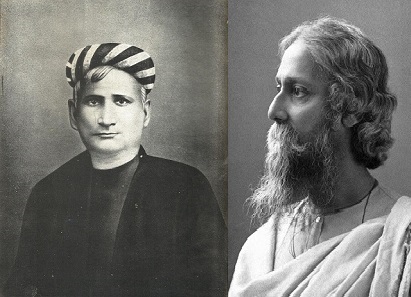|
Agnibeena
Agnibeena ( bn, অগ্নিবীণা) is the first poetry book written by Kazi Nazrul Islam, one of the most famous Bengali poet of the first half of the twentieth century. It was published in the month of Kartik, the Bengali year 1329 (October, 1922). There are twelve poems in this book. List of poems Agnibeena contains a preface where Nazrul dedicated the book to Barindra Kumar Ghosh and 12 poems. The most famous poem of this book is " Bidrohi". * "Pralayollas Pralayollas ( bn, প্রলয়োল্লাস, ''The Ecstasy of Destruction'' or ''Destructive Euphoria''), also known after its first line as ''Tora sab jayadbhani kar'' is a popular revolutionary Bengali song set to Dadra Tala, who ..." * " Bidrohi" * "Raktambor-Dharini Ma" * "Agamoni" * "Dhumketu" * "Kamal Pasha" * "Anwar" * "Ranobheri" * "Shat-el-Arab" * "Kheyaparer Taroni" * "Qurbani" * "Muharram" References {{Kazi Nazrul Islam Kazi Nazrul Islam 1922 poetry books Bengali poetry ... [...More Info...] [...Related Items...] OR: [Wikipedia] [Google] [Baidu] |
Bidrohi (poem)
"Bidrohi" ( bn, "বিদ্রোহী", links=https://www.bongdunia.com/bidrohi-kobita-nazrul-islam/; en, "The Rebel") is a popular revolutionary Bengali poem and the most famous poem written by Kazi Nazrul Islam in December 1921. Originally published in several periodicals, the poem was first collected in October 1922 in a volume titled ''Agnibeena'': the first anthology of Nazrul's poems. Many has seen, in this poem, elements of romanticism, heroism, and love. Syed Ali Ahsan wrote that the poem was inspired by Walt Whitman's "Song of Myself". Literary style This poem, through which Nazrul celebrated human creative powers, asserted his affirmation of the individual human capacity for heroic action and human unity and solemnly called for rebellion against all forms of oppression (including that of the British in India) elevated him to the status of a national figure. He included literary elements from Hindu, Islamic and Greek mythology in this poem. Publication history ... [...More Info...] [...Related Items...] OR: [Wikipedia] [Google] [Baidu] |
Kazi Nazrul Islam
Kazi Nazrul Islam ( bn, কাজী নজরুল ইসলাম, ; 24 May 1899 – 29 August 1976) was a Bengali poet, Bengali literature, writer, Bangladeshi music, musician, and is the national poet of Bangladesh. Nazrul is regarded as one of the greatest poets in Bengali literature. Popularly known as Nazrul, he produced a Complete Works of Kazi Nazrul Islam, large body of poetry, music, messages, novels, stories, etc. with themes that included equality, justice, anti-imperialism, humanity, rebellion against oppression and religious devotion. Nazrul's activism for political and social justice as well as writing a poem titled as "Bidrohī", meaning "the rebel" in Bengali, earned him the title of "Bidrohī Kôbi" (''Rebel Poet''). His compositions form the avant-garde music genre of Nazrul Geeti, Nazrul Gīti (''Music of Nazrul''). Born into a Bengali Muslim Qadi#IndoPak Region, Kazi family hailing from Bardhaman district, Burdwan district in Bengal Presidency (now in West Be ... [...More Info...] [...Related Items...] OR: [Wikipedia] [Google] [Baidu] |
Pralayollas
Pralayollas ( bn, প্রলয়োল্লাস, ''The Ecstasy of Destruction'' or ''Destructive Euphoria''), also known after its first line as ''Tora sab jayadbhani kar'' is a popular revolutionary Bengali song set to Dadra Tala, whose lyrics and tune were written by national poet Kazi Nazrul Islam Kazi Nazrul Islam ( bn, কাজী নজরুল ইসলাম, ; 24 May 1899 – 29 August 1976) was a Bengali poet, Bengali literature, writer, Bangladeshi music, musician, and is the national poet of Bangladesh. Nazrul is regarded as one ... in 1921. It was the first revolutionary Bengali poem collected in early 1922 in a volume titled Agnibeena: the first anthology of Nazrul's poems. Lyrics References {{reflist External linksKabir Chowdhury's English translation of ''Pralayollas'' Bengali-language poems Poems written by Kazi Nazrul Islam 1921 poems ... [...More Info...] [...Related Items...] OR: [Wikipedia] [Google] [Baidu] |
Bengali Language
Bengali ( ), generally known by its endonym Bangla (, ), is an Indo-Aryan languages, Indo-Aryan language native to the Bengal region of South Asia. It is the official, national, and most widely spoken language of Bangladesh and the second most widely spoken of the 22 scheduled languages of India. With approximately 300 million native speakers and another 37 million as second language speakers, Bengali is the List of languages by number of native speakers, fifth most-spoken native language and the List of languages by total number of speakers, seventh most spoken language by total number of speakers in the world. Bengali is the fifth most spoken Indo-European language. Bengali is the official language, official and national language of Bangladesh, with 98% of Bangladeshis using Bengali as their first language. Within India, Bengali is the official language of the states of West Bengal, Tripura and the Barak Valley region of the state of Assam. It is also a second official lan ... [...More Info...] [...Related Items...] OR: [Wikipedia] [Google] [Baidu] |
British India
The provinces of India, earlier presidencies of British India and still earlier, presidency towns, were the administrative divisions of British governance on the Indian subcontinent. Collectively, they have been called British India. In one form or another, they existed between 1612 and 1947, conventionally divided into three historical periods: *Between 1612 and 1757 the East India Company set up Factory (trading post), factories (trading posts) in several locations, mostly in coastal India, with the consent of the Mughal emperors, Maratha Empire or local rulers. Its rivals were the merchant trading companies of Portugal, Denmark, the Netherlands, and France. By the mid-18th century, three ''presidency towns'': Madras, Bombay and Calcutta, had grown in size. *During the period of Company rule in India (1757–1858), the company gradually acquired sovereignty over large parts of India, now called "presidencies". However, it also increasingly came under British government over ... [...More Info...] [...Related Items...] OR: [Wikipedia] [Google] [Baidu] |
Nazrul Institute
The Nazrul Institute is Bangladesh's national institute, established in February 1985. Its headquarters are located in Kabi Bhaban in Dhanmondi, Dhaka, Bangladesh. It fulfills a number of roles; promoting the literary work of the poet Kazi Nazrul Islam, recognising excellence in literature research by conferring awards, and public engagement. Structure and governance The institute is headed by an executive director who has a trustee board to advise them. The first executive director of the institute was Mohammad Mahfuzullah and the first chairman of the trustee board was Mohammad Nasiruddin. Functions and activities According to the ''Nazrul Institute Ordinance'' of 12 June 1984, the functions and objectives of the institute regarding the poet are: # Conduct study and research on the writings # Compile, preserve, edit and publish poems and songs # Organise discussion meetings, lectures, seminars, conferences # Run a library containing books on the poet's life, literature, music ... [...More Info...] [...Related Items...] OR: [Wikipedia] [Google] [Baidu] |
Abanindranath Tagore
Abanindranath Tagore (Bengali: অবনীন্দ্রনাথ ঠাকুর; 7 August 1871 – 5 December 1951) was the principal artist and creator of the "Indian Society of Oriental Art". He was also the first major exponent of Swadeshi values in Indian art. He founded the influential Bengal school of art, which led to the development of modern Indian painting.Abanindranath Tagore, A Survey of the Master’s Life and Work by Mukul Dey , reprinted from "Abanindra Number," ''The Visva-Bharati Quarterly,'' May – Oct. 1942. He was also a noted writer, particularly for children. Popularly known as 'Aban Thakur', his books ''Rajkahini, Buro Angla, Nalak,'' and '' Khirer Putul ... [...More Info...] [...Related Items...] OR: [Wikipedia] [Google] [Baidu] |
Bengali Poet
Bengali poetry is a rich tradition of poetry in the Bengali language and has many different forms. Originating in the Bengal region of South Asia, the history of Bengali poetry underwent three successive stages of development: poetry of the early age (like '' Charyapad''), the Medieval period and the age of modern poetry. All ages have seen different forms of poetry and poetical tradition. It reached the pinnacle during the Bengali Renaissance period although it has a rich tradition and has grown independent of the movement. Major Bengali Poets throughout the ages are Chandidas, Alaol, Ramprasad Sen, Michael Madhusudan Dutt, Nabinchandra Sen, Rabindranath Tagore, Dwijendralal Ray, Satyendranath Dutta, Kazi Nazrul Islam, Jibanananda Das, Jasimuddin, Sukanta Battacharya, Al Mahmud. Introduction Poetry in the colloquial dialect of Bengal first originated from Prakrit, and based upon local socio-cultural traditions. It was antagonistic towards Vedic rituals and laws as opposed t ... [...More Info...] [...Related Items...] OR: [Wikipedia] [Google] [Baidu] |
Poem
Poetry (derived from the Greek ''poiesis'', "making"), also called verse, is a form of literature that uses aesthetic and often rhythmic qualities of language − such as phonaesthetics, sound symbolism, and metre − to evoke meanings in addition to, or in place of, a prosaic ostensible meaning. A poem is a literary composition, written by a poet, using this principle. Poetry has a long and varied history, evolving differentially across the globe. It dates back at least to prehistoric times with hunting poetry in Africa and to panegyric and elegiac court poetry of the empires of the Nile, Niger, and Volta River valleys. Some of the earliest written poetry in Africa occurs among the Pyramid Texts written during the 25th century BCE. The earliest surviving Western Asian epic poetry, the ''Epic of Gilgamesh'', was written in Sumerian. Early poems in the Eurasian continent evolved from folk songs such as the Chinese ''Shijing'', as well as religious hymns (the Sanskrit ' ... [...More Info...] [...Related Items...] OR: [Wikipedia] [Google] [Baidu] |
Barindra Kumar Ghosh
Barindra Kumar Ghosh or Barindra Ghosh, or, popularly, Barin Ghosh (5 January 1880 – 18 April 1959) was an Indian revolutionary and journalist. He was one of the founding members of Jugantar Bengali weekly, a revolutionary outfit in Bengal. Barindra Ghosh was a younger brother of Sri Aurobindo. Early life Barindra Ghosh was born at Croydon, near London on 5 January 1880 although his ancestral village was Konnagar in Hooghly District of present-day West Bengal.Bandyopadhyay, Amritalal, ''Rishi Aurobindo'', 1964, Biswas Publishing House, p. 6 His father, Dr. Krishnadhan Ghosh, was a physician and district surgeon. His mother Swarnalata was the daughter of the Brahmo religious and social reformer, scholar Rajnarayan Basu. Revolutionary and a spiritualist in later life, Aurobindo Ghosh was Barindranath's third elder brother. His second elder brother, Manmohan Ghose, was a scholar of English literature, a poet and professor of English at Presidency College, Calcutta and at Dhaka U ... [...More Info...] [...Related Items...] OR: [Wikipedia] [Google] [Baidu] |
New Age (Bangladesh)
''New Age'' is a Bangladeshi English-language daily newspaper published from Dhaka."7 raped everyday in September," October 2, 2019, '','' retrieved March 30, 2020"Police attempt to raid New Age office," December 28, 2014, '' |
1922 Poetry Books
Nineteen or 19 may refer to: * 19 (number), the natural number following 18 and preceding 20 * one of the years 19 BC, AD 19, 1919, 2019 Films * ''19'' (film), a 2001 Japanese film * ''Nineteen'' (film), a 1987 science fiction film Music * 19 (band), a Japanese pop music duo Albums * ''19'' (Adele album), 2008 * ''19'', a 2003 album by Alsou * ''19'', a 2006 album by Evan Yo * ''19'', a 2018 album by MHD * ''19'', one half of the double album ''63/19'' by Kool A.D. * ''Number Nineteen'', a 1971 album by American jazz pianist Mal Waldron * ''XIX'' (EP), a 2019 EP by 1the9 Songs * "19" (song), a 1985 song by British musician Paul Hardcastle. * "Nineteen", a song by Bad4Good from the 1992 album '' Refugee'' * "Nineteen", a song by Karma to Burn from the 2001 album ''Almost Heathen''. * "Nineteen" (song), a 2007 song by American singer Billy Ray Cyrus. * "Nineteen", a song by Tegan and Sara from the 2007 album '' The Con''. * "XIX" (song), a 2014 song by Slipknot. ... [...More Info...] [...Related Items...] OR: [Wikipedia] [Google] [Baidu] |






.jpg)